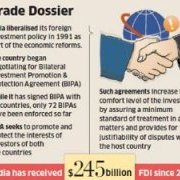31-Mar-2012
Economic Times
The Indian government is likely to oppose any move by Vodafone Plc to invoke the India-Netherlands Bilateral Investment Promotion and Protection Agreement (BIPA) if it is forced to cough up Rs 12,000 crore in taxes on the grounds that the investment was routed through several step down firms based in different countries and that the treaty does not cover tax disputes.
29-Mar-2012
Economic Times
Norway’s Telenor will seek ’compensation for all investment, guarantees and damages’ if the Indian government fails to sort out issues related to its licence cancellation within the next six months, the company said.
5-Mar-2012
Sydney Morning Herald
The federal government is standing firm against Australian and US business demands that it allow controversial dispute settlement clauses into an ambitious new Pacific free trade deal.
17-Feb-2012
Amazon Defense Council
The Andean Commission of Jurists and five prestigious international law experts from around the world have joined a growing chorus of criticism targeting Chevron’s attempt to use a secret investor arbitration as part of its campaign to evade an $18 billion environmental judgment in Ecuador, according to letters released today.
17-Feb-2012
The Economist
Argentina has never threatened to quit ICSID. Its government insists it is open to honouring the awards. The only delay, it says, is that the claimants have not brought their rulings to a local court for collection.
1-Feb-2012
Amazon Defense Coalition
On February 11, Chevron will ask a panel of three private lawyers named as "arbitrators" under the BIT to nullify the entire nine-year Ecuadorian court process that recently found the company liable for $18 billion in clean-up costs.










